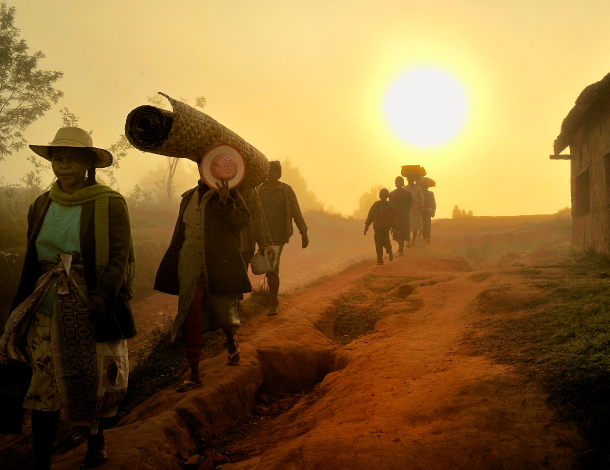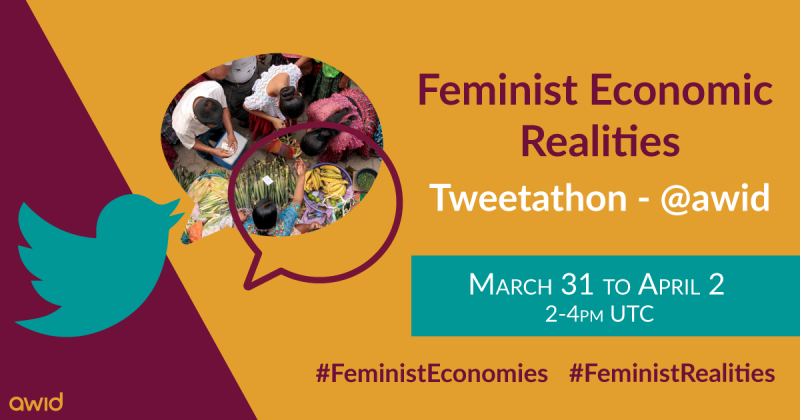As we write this text, the climate crisis, the COVID-19 pandemic, growing authoritarianism and fundamentalisms along with severe economic inequalities are magnifying what has been known by many - the exploitation of people’s labor and the earth’s natural resources in the name of market-based neo-liberal economics cannot and will not save us.
Despite the mounting discredit, the capitalist model is not falling short of defenders - as the global elites keep rehashing the same old “there is no alternative” line. Meanwhile, stock markets continue to plunge, which will likely lead to another global economic crisis of major proportions in the near future. In other words, capitalist economics, and the systemic webs of oppression it has woven, is not a viable option for anyone who is committed to social justice.
While this context once again highlights the shortcomings of the current economic system and the alarming turbulences that loom ahead – moments such as these also represent opportunities to undertake and consolidate much-needed paradigmatic shifts. This is especially the case as we continue to witness the emergence and increasing visibility of different forms of resistance and articulation of practices throughout the world that center people and the planet. The practices of communities -particularly in the Global South but also marginalized communities in the Global North- which are building power from below are responding to intersecting forms of oppression.

A new world order is not a utopian vision: it is right in front of us! It is in the fingers of the farmers tilling the soil who are committed to agroecology, it is in networks of mutual aid that are popping up in times of crisis, it is in the land occupations that say no to privatization, and in the workers organizing.
Introducing: Feminist Economic Realities
Feminisms have a long history of resisting racism, coloniality, modernity and anthropocentrism. As part of this journey, feminist movements have been advancing Feminist Economic Realities. Movements from anti-racist, to queer, to indigenous, to migrant, to sex workers to anarchist movements and many more, have been building economic, political, social and cultural systems based in self-determination, mutual aid and reciprocity both in theory and practice for a long time.
As feminist economic realities continue multiplying and weaving ties between themselves, they are advancing in the construction of the new worlds we so desperately need and providing us with pathways and blueprints to build from. We invite you to look at these few examples below - however big or small - not as aggregated “stories” but rather as a web of interconnected practices that are as diverse as feminist movements are.
7 examples of feminist practices that are shaping new economies
-
In India, 5,000 women have come together to develop community-based food sovereignty systems, including grain and seed banks, using knowledge that has been held in their communities for hundreds of years. The Women Sangams (groups) of Deccan Development Society (DDS) are not only challenging agribusiness and land-grabbing by corporate actors, they are also advancing communal land tenure and deepening their practices by unearthing community practices that are in balance with the soil and food that they grow.
-
In Chiapas, Mexico, women have created a moneyless economy through a practice called El Cambalache. In this non-hierarchical economic system, everything has the same value. People exchange things they no longer need for things they need, and share knowledge and skills with each other through mutual aid networks.
-
In Jackson, Mississippi, Cooperation Jackson is building economic sovereignty through the creation of a network of cooperatives and communal land ownership through the installation of community land trusts.
-
Across West Africa, women farmers in Nous Sommes la Solution/ We Are The Solution have built, and are continuing to build, an agroecology movement that is building local economies, feeding communities, building seed sovereignty, mitigating climate change, and amplifying the knowledges of women farmers across Africa.
-
The Usha Cooperative in India was founded when mainstream banks refused services to sex workers in Sonagachi. Sex workers self-organized to prioritize their economic concerns and set up their own financial institution. The Usha Cooperative is cooperative bank of over 20,000 sex workers and has provided over USD 4.7M in loans to 7,231 sex workers in a span of one year. With a membership entirely of sex workers, the bank provides real ownership and influence over the cooperative’s governance and management, pioneering ways for individuals and communities on the margins to build economic power on their own terms.
-
Started in 1961 by peasant farmers in Cuba, Asociación Nacional de Agricultores Pequeños (ANAP) has impacted the lives of 300,000 families throughout Cuba by using popular education to grow a political consciousness on cooperative economics, radical agrarian reform, agroecology and mutual aid. As part of this work ANAP has advanced farmer-farmer learning practices at a national scale which are participatory and horizontal (everyone is a knowledge holder and sharer) which are continually adapted to meet the needs of the Cuban people.
-
In Colombia, the Afro-Descendant Women Association in Northern Cauca are reconstructing how the work on traditional farms reactivated a mode of production complementary to economic activities of fishing and traditional mining in the department of Cauca in such a way that the working time and the income received are given to women. In addition, there is a recovery of markets run by women producers who carry food from the field that is organically planted and the production of toiletries and handicrafts. In this way, the memory on the ways of producing persists, the local economy based on community ownership is strengthened and food sovereignty is guaranteed. The objective at present and in the near future is to promote agricultural food circles and ancestral medicine together with more women-led collectives and organizations in the region.
Do you know of other examples around you?
It could be a long-existing initiative or one that is in the making. Let’s amplify the various practices in each of our communities and enrich and grow the diverse web of our living Feminist Economic Realities!
In addition to additional online conversations that will be held over the next year there will also be activities on feminist economic realities at the next AWID Forum and a multi-media arts installation highlighting the creativity that builds and flourishes from the feminist economic realities around the world.

2224x1253.jpg)